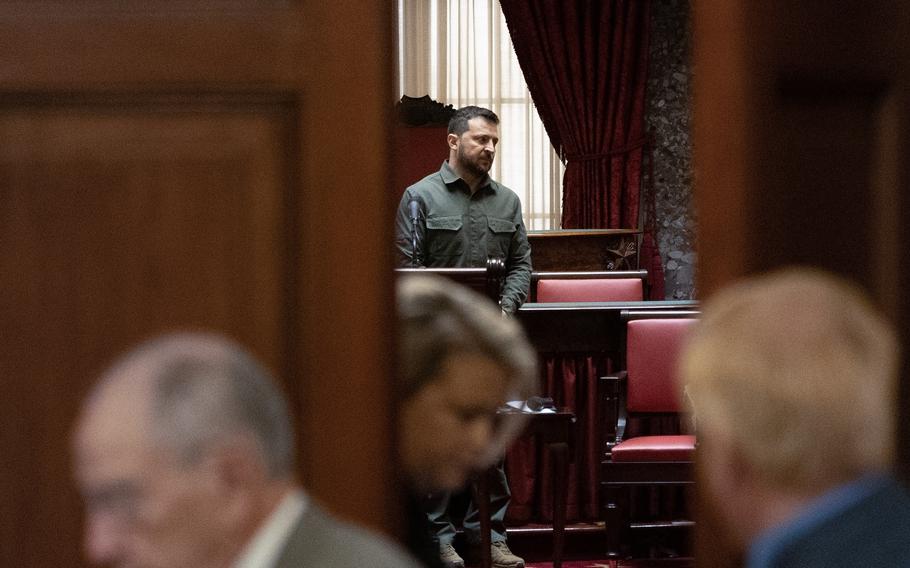
Ukrainian President Volodymyr Zelensky speaks to U.S. lawmakers in Washington in September. (Tom Brenner/The Washington Post )
Olena Zelenska, Ukraine’s first lady, declined an invitation from the White House to attend Thursday’s State of the Union address, forgoing one of Washington’s most dignified events and underscoring the complicated politics facing her war-torn country.
The intent had been to seat first lady Jill Biden near Zelenska and Yulia Navalnaya, the widow of Russian opposition leader Alexei Navalny, who died last month in an Arctic prison, according to officials familiar with the planning. The image of both women, each a symbol of resistance to Russian President Vladimir Putin, would offer a powerful backdrop to President Biden’s address to a joint session of Congress.
But Navalnaya’s potential presence caused discomfort for the Ukrainians, said people familiar with Kyiv’s deliberations. Though her late husband is widely hailed as an anticorruption icon who risked his life to oppose Putin, Navalny’s legacy in Ukraine is clouded by past statements that Crimea, which Putin annexed in 2014, belonged to Russia.
Even though Navalny’s views later evolved into support for Ukraine’s internationally recognized 1991 borders, many Ukrainians view him as out of step with Kyiv’s goals.
“While in the West, we have always thought of him as someone who fought bravely and courageously against Putin, in Ukraine, Navalny is seen as in line with a mind-set of Russian nationalism and imperialism,” said Alina Polyakova, president of the Center for European Policy Analysis, a Washington think tank.
“Navalny opposed Russia’s full-scale invasion of Ukraine, of course, but in 2014, when Russia first invaded Ukraine, he very much was in line with a general Russian view that saw Crimea as part of Russia’s historical lands,” Polyakova said.
A White House official said Zelenska’s decision was probably due to “schedule conflicts,” and referred further questions to Zelenska’s office, which did not respond to a request for comment.
The official added that the seating arrangement was not finalized until recently.
Navalnaya also declined to attend Biden’s address, according her spokeswoman, who cited fatigue as a factor.
“Yulia was indeed invited and considered going, but I think everyone forgets the circumstances against which the events unfolded,” said Navalnaya spokeswoman Kira Yarmysh. “Yulia’s husband died two weeks ago. She’s been traveling all this time. Today is the first day she’s been home at all. Like any human being, she needs time to recover, and so while she very much appreciates the invitation, she needs to recover at least a little now.”
One U.S. official said the White House likely did not inform Kyiv that Navalnaya had decided against attending, though her presence wasn’t the only concern for the Ukrainians, according to people familiar with the situation, who like some others interviewed for this report spoke on the condition of anonymity to describe private discussions. Another issue for Kyiv, as it seeks additional U.S. security assistance, is being viewed as too closely aligned with Biden. The president has been Ukraine’s chief advocate, but the government of Zelenska’s husband, President Volodymyr Zelensky, has sought to avoid further politicization of the war effort.
At the moment, Ukraine is desperately lobbying House Republicans to allow a vote on Biden’s request for $60 billion in aid - a package opposed by the likely Republican presidential nominee, Donald Trump. Ukraine is running low on artillery against Russia’s better-equipped forces and is beginning to lose strategic towns along the front lines.
While urging lawmakers to support the funding measure, Ukraine does not want to offend Republicans, who could control the White House next year depending on the outcome of November’s election.
“The Ukrainians are very sensitive to our internal political dynamics,” said Polyakova.
When Zelensky traveled to Washington in December, he took great pains to cast aid for Ukraine as a bipartisan cause. “He had the same challenge of trying to walk a very fine line to not appear as too supportive of President Biden, even though he of course favored Biden’s agenda to arm and equip Ukraine,” she said.
In his remarks on Thursday, Biden is expected to urge House Republicans to pass Ukraine funding “as quickly as possible,” said a White House official.
Each year, the first lady invites a range of individuals to join her at the State of the Union, and the president will often mention them in his speech as he highlights or promotes a certain policy or issue area.
The White House has not announced the first lady’s guests for this year beyond Kate Cox, a Dallas-area woman who traveled outside of Texas to receive an abortion because of the state’s near-total ban on the procedure.
Cox sought an abortion after she learned her fetus had a typically fatal genetic condition and that carrying the pregnancy to term could jeopardize her fertility in the future.
Last year, Jill Biden brought a number of guests, including the Ukrainian ambassador to the United States, Oksana Markarova. Among the other guests were Paul Pelosi, husband of former House Speaker Nancy Pelosi (D-Calif.), a Holocaust survivor, a father who lost a daughter to a fentanyl overdose and a cancer survivor.
Lawmakers also bring guests, and among those expected to attend this year are the parents of Evan Gershkovich, a Wall Street Journal reporter who has been detained in Russia. Others include the first person born via in vitro fertilization in the United States and families of hostages being held in the Gaza Strip.
Natalia Abbakumova and Serhiy Morgunov contributed to this report.